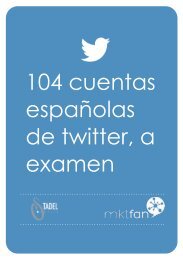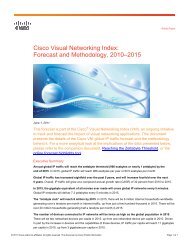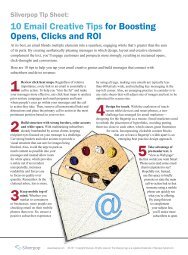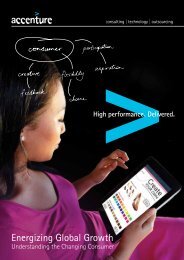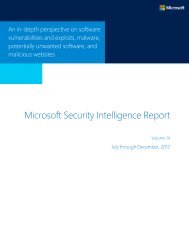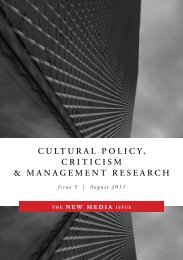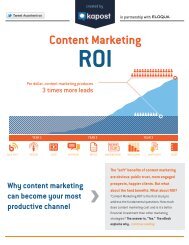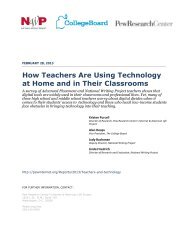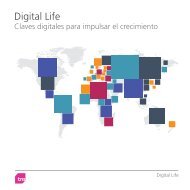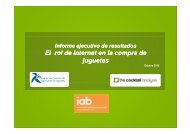Open Innovation 2.0 Yearbook 2013 - European Commission - Europa
Open Innovation 2.0 Yearbook 2013 - European Commission - Europa
Open Innovation 2.0 Yearbook 2013 - European Commission - Europa
You also want an ePaper? Increase the reach of your titles
YUMPU automatically turns print PDFs into web optimized ePapers that Google loves.
Table 2: Possible 1-year work process to realise pioneering innovation regions in practice<br />
Engaging<br />
stakeholders<br />
90 day start-up process to create the societal innovation ramp 9 month<br />
Mapping the<br />
context<br />
Exploring the<br />
context to<br />
understand the<br />
challenges<br />
Reframing issues<br />
and problems<br />
Creating the<br />
ramp<br />
follow-through<br />
Harvesting ideas<br />
and energy for fast<br />
prototyping, rapid<br />
realisation and early<br />
results<br />
Weeks 1–2 Weeks 2–4 Weeks 5–6 Weeks 7–9 Weeks 9–12 Weeks 13–52<br />
Focused<br />
conversations<br />
Issues & ideas Navigational<br />
markers: where<br />
we come from,<br />
where are we<br />
going<br />
Regional and<br />
external actors<br />
and stakeholders<br />
IC mapping Round table ACSI Societal<br />
<strong>Innovation</strong> Labs<br />
Preparing the<br />
agenda<br />
Key decision<br />
makers and<br />
entrepreneurs<br />
A renewal process for regions<br />
In a 12-month process to pioneer regional innovation<br />
in practice, regions could consider the following.<br />
• Create focused conversations to stimulate<br />
‘thinking beyond’ and energise entrepreneurial<br />
spirit.<br />
The focused conversation is being used in<br />
the Skåne Region of Sweden to address<br />
issues of the innovation economy in such<br />
a way that Skåne can better focus on the<br />
opportunities and challenges in its work,<br />
and ask and explore the questions required<br />
to help realise its ambitious vision. The conversation<br />
is aimed at moving participants<br />
beyond their usual ways of looking at innovative<br />
regions, the knowledge economy,<br />
their own aims and ambitions, and what<br />
may be needed to achieve the region’s<br />
goals. It is a process of pre-thinking issues,<br />
objectives and challenges: not simply talking<br />
about the next brain park or innovation<br />
centre one could establish, but looking<br />
beyond today’s dominant logic, yesterday’s<br />
decisions and participants’ personal beliefs<br />
into what different futures may hold.<br />
• Change the narrative through enhanced awareness<br />
of context and issues, based on intellectual<br />
capital mapping and forecasting.<br />
The National Intellectual Capital (NIC 40)<br />
index and books, researched and written by<br />
NCP members, use IC metrics and mapping<br />
Energise people<br />
& reframe the<br />
challenges<br />
Local and external<br />
experts<br />
Future Centre<br />
sessions<br />
Preparing for<br />
enacting the<br />
decisions<br />
Regional and<br />
external actors<br />
and stakeholders<br />
Diverse followthrough<br />
activities<br />
and many fast prototypes:<br />
ACSI camps<br />
& SI Labs, Future<br />
Centres / Living Labs<br />
Prototyping and<br />
testing promising<br />
solutions, working in<br />
innovation networks<br />
and communities<br />
Directly involving all<br />
regional stakeholders<br />
in the RIE<br />
to understand the dynamics of change<br />
that regions undergo. Intellectual capital<br />
describes the source of the competencies<br />
and capabilities deemed essential for<br />
national economic growth, human development,<br />
and quality of life. The results of<br />
national level intellectual capital studies<br />
and ranking provide a direction for nations<br />
— and clusters of nations — to benchmark<br />
and to make wise decisions for the effective<br />
investment of intangible assets and<br />
their development in the era of the knowledge<br />
economy. The index gives statistically<br />
validated reports on intellectual capital indicators<br />
for 40 countries, based on research<br />
findings of 14 years: it identifies intellectual<br />
growth patterns and details about the<br />
impact and implications of these patterns<br />
for innovation, business creation, competitiveness,<br />
growth, and development [9].<br />
• Organise regional round tables to help decisionmakers<br />
and key stakeholders to interpret the<br />
maps and metrics, and more clearly understand<br />
the potential impact of policies, technologies,<br />
and strategic choices.<br />
The round table process consists of a dialogue<br />
between local and international<br />
experts in knowledge policies and decisionmakers.<br />
Experience shows that this kind of<br />
dialogue enables relevant issues for the<br />
continuing transformation of a region into<br />
a knowledge society to be identified and<br />
91



